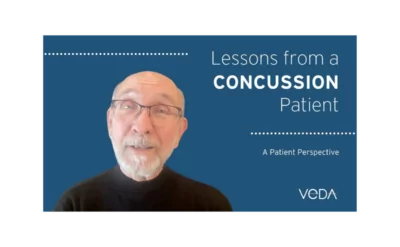
Vestibular Concussion Recovery, Lessons From a Patient
Recovering from a concussion is a process. During his recovery process, Stephen learned some important lessons about healing, rest, and understanding his symptoms. In this video, he shares those lessons so that you can learn from his mistakes and not make the same mistakes yourself.
TRANSCRIPT
VeDA uses otter.ai to create machine-generated transcripts. This transcript may contain errors.
Stephen Haslam
You’ve got a concussion. In your healing process, you’re gonna make some mistakes. I’m going to share some of mine with you. So maybe you can learn from them and not make those same mistakes yourself.
Hi, my name is Steven Haslam, I am not a health care provider, I’m a concussion patient. Maybe you can learn from some of the mistakes I made while I was recovering from my concussion. Lesson number one, don’t obsess over your symptoms. So I was told to keep good records of my experience. It’s what symptoms did I have when how often? What triggered them? What did I do to cope and how did that work? So I was told this diary would be especially useful for insurance purposes to get the most possible financial support from the insurance company. And it also gave valuable information to my doctors and therapists. Because it was a log of what happened to me when they couldn’t see me. But the problem was, I started obsessing on my symptoms. You know, I, I think I thought I would be handing it a better report if I recorded more symptoms. So headaches, wooziness, dizziness, exhaustion, brain fog, blood pressure fluctuations. So I stayed focused on the symptom. I made a detailed Excel chart to map out everything and measured exactly, you know, on a scale of one to 10 how intense it was. I thought I was doing the right thing because I was just doing what I was told to do. But I was overdoing what I was told to do. My therapist redirected my focus by saying, I should be aware of the beginning of a symptom, and then immediately shift my attention to breathing, relaxing, grounding, and imagining myself well, the opposite of the symptom. See, if I stay focused on the symptoms, I’ll create a feedback loop in my mind so that my autonomic nervous system thinks there’s a problem, and it will continue to create symptoms. She actually told me stop taking records of my blood pressure for a while you’re overdoing it. So why you need to use your mind to be aware of your symptoms. You also need to practice the techniques your healthcare providers give you and discipline your mind to focus on the opposite of the symptom being well, lesson number two, don’t push through your symptoms. I used to run marathons, I was a fanatic, pushing through the pain in order to break through to the other side, you got to be that way if you run marathons I tended to take the same approach with my concussion symptoms thinking, if I keep active even when my symptoms are overwhelming me if I push past them. This was my old pain as gain approach. Ironically, I used to teach stress management would say pain is necessary. Suffering is optional. If I kept trying to push through the pain, it turned into suffering. My therapist explained how this principle related to my concussion symptoms. The symptoms were a signal that I needed to make a change. It was my autonomic nervous system telling me slow down so that the brain can rest. The more I push, the more my brain will create symptoms through the autonomic nervous system to get me to stop so it can repair itself. I had to learn that this healing process is a different kind of Marathon. And it includes resting and practicing the activities my health care providers give me lesson number three, rest is not doing nothing. Rest is actually doing something. It took a while before I really understood why I needed to rest. The point that they got across to me was that rest is not doing nothing. It’s doing something. It’s letting my brain heal itself. I thought I understood that message intellectually. I got I got the idea. So I would sit back in my recliner with my eyes closed, resting my body. But all this time I was busy planning all the things I needed to do when I was done resting. At one point, it occurred to me that I was essentially resting as fast as I could in order to get over it with it, because I felt like I should be doing something productive, you know, something to prove I was getting well, not just sitting around being lazy. They pointed out that resting is not doing nothing. While I’m arresting my body, and my mind, my brain and nervous system are busy working at the healing process. I didn’t know how to turn off my mind in order to let my brain breast. So the director of the Methodist Hospital concussion Center here in Houston, recommended that I listened to recordings of brown noise, you can find it easily on YouTube. As my mind wanders, I just keep bringing my attention back to the gentle sound of the brown noise. It’s a basic meditation technique. It helped tremendously. But I had to learn that I can’t rush through my resting. The brain is going to take its own time to heal. Give it the time that it needs. And I wish you good luck with your healing process.
